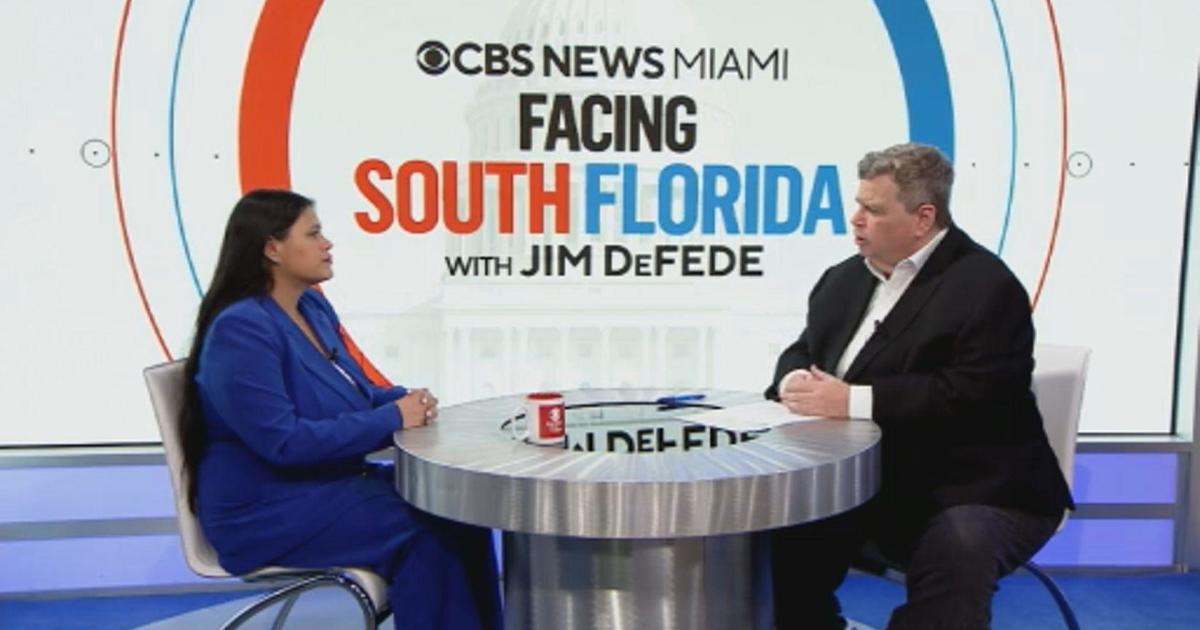With grocery prices on the rise, here's what you can do stop eating your income
MIAMI - It's a question more people ask themselves daily as grocery store prices continue to rise. It might not be as bad as in recent years, but it's still growing.
The latest consumer price index shows baby food and formula are up nearly 9% over 2023. Popular meats, beef and veal, are up more than 7%.
However, in other food categories, some items trend down.
In 2024, we are paying 17% less for eggs and nearly 4% less for fish and seafood.
CBS News Miami's Joe Gorchow spoke with Miami-Dade grocery shoppers and a local farmer about why prices rise and fall.
"Usually at my house, we get newspapers with coupons and sales, all that stuff," said Jordan, grocery shopping in Doral.
A quest for deals living in South Florida, where rising costs drive the people born and raised here – to leave.
"I moved from here," said Jani, outside another grocery store in Miami-Dade. "I lived 27 years here. You could give me a house here, and I'd tell you, no, I don't want to come back. From insurance to homes, to rent, everything, gas."
CBS News Miami reporter Joe Gorchow asked her, "Is it more expensive here?"
"Yes," she quickly replied.
Back to our local shopper, Jordan, Gorchow asked him, "How much more are you paying for groceries now, say, compared to this time last year?"
"I don't know about this year; I remember before COVID, two to three times as much," added Jordan. "They increase it little by little."
Gorchow kept asking more shoppers if they felt the pinch.
"Absolutely," chimed Armando, pushing his grocery cart with goods back to his car.
During the walk to his car, Gorchow asked him, "Do you have any advice to people on how to save money?"
"No idea, go on a diet," quipped Armando.
He says he does what he can to save. And when it comes to spending more on food, he's not alone. According to the U.S. Department of Agriculture, Americans spend more than 11% of their disposable income on food. A recent Wall Street Journal report reveals it's the highest level in three decades.
Part of the uptick in costs starts where food grows.
"We cannot compete," shared Sam Accursio, a major grower of fruits and vegetables in the Redland. "A grower in Mexico can sell it way cheaper than I could. You know, they're paying $8 a day, where I'm paying from $130 to $200 a day for the same labor."
Accursio has worked on his family farm in the Redland for over 40 years.
"When I wake up in the morning, I hear the good Lord saying, feed people," said Accursio.
It drives his purpose, even as he says the costs to produce all his crops grow.
"Diesel fuel for this harvester was 1.20 a gallon four years ago," said Accursio. "Now, it's 3.80."
"Tractor tires on these harvesters did not cost $2000 a piece," emphasized Accursio. "They cost $200 a piece, everything has skyrocketed."
Accursio estimates that his farm produces 50 million servings of vegetables annually. He distributes his crops up and down the eastern seaboard, locally as close as Redland and Miami and as far north as Canada.
"We used to have 45 growers here; now we have three growing vegetables, sizeable growers that feed the eastern United States," added Accursio. "If the supply is low, the demand is high; the price goes up. If you have adverse weather like we've had in November and December, the price skyrockets because production is low."
Rising costs on the farm are passed onto consumers like Hernando.
"When we come here, we purchase what we need only," said Hernando, one of many local grocery shoppers CBS News Miami spoke with for this story.
Hernando hints that the simplest solution he has to saving money at the grocery store might be the most enjoyable one."
"When you come to the grocery, you have to eat first," said Hernando. "Otherwise, you're going to buy a lot of stuff you don't need."
Moraima, another conscientious super saver, has another tip beyond a snack before filling a grocery cart.
"The first thing you must do is make a list when you go into a grocery or supermarket; you don't buy what you don't need," added Moraima.
Other tips include couponing, if time allows, shopping at different grocery stores for certain products, looking for sales, and limiting what you put in your cart to what you need.
Back on the farm, Accursio says maintenance costs hurt their bottom line, and if the costs of running farmland continue rising, he says many farmers will be out of business.




